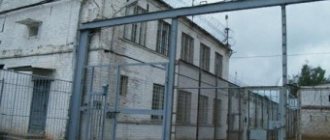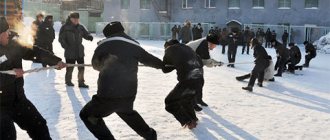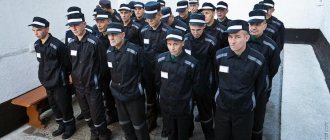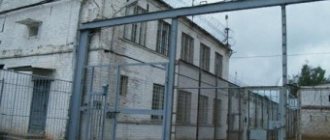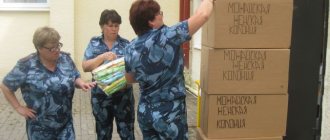Some people have heard about the “red zones” in Russia, but few fully understand what these institutions are and how they differ from ordinary colonies. There are about 10 correctional colonies of different regimes throughout the country for so-called “former employees”. This list includes convicts who previously worked as police officers, prosecutors, judges, and employees of the Federal Penitentiary Service. One of these zones is located in the city of Nizhny Tagil, Sverdlovsk region. The institution qualifies as a general regime colony.
Structure of the Federal Penitentiary Service
The Federal Penitentiary Service is a fairly young structure, which was created only in 2004–2005. Previously, the department belonged to the Ministry of Internal Affairs, and in Soviet times, even conscript soldiers were responsible for guarding sensitive facilities. Today, the Federal Penitentiary Service of Russia is under the control of the Ministry of Justice of the Russian Federation and performs the functions of executing criminal punishment in relation to convicted persons. The Federal Penitentiary Service controls all correctional institutions in the country: colonies, pre-trial detention centers, zones and other material and technical organizations and institutions.
For several decades now, Russia has continued to practice the penitentiary system of punishment, that is, in our country we not only protect prisoners during the period of restriction of their freedom from society, but also work is carried out to correct them and return them to the ranks of society. In recent years, this trend has only intensified. The leadership of the colonies tries to create favorable conditions for life and correction: they organize places of work, leisure and education. Moreover, convicts are given psychological training, taught various professions, and introduced to Orthodoxy. On the territory of the colony there is an opportunity to receive higher education remotely. To what extent these conditions are met and whether they are necessary is a separate question.
Escape attempts
Just like in other places of detention, those who have broken the law try to escape. Such attempts were repeatedly stopped, with legal consequences for the fugitives.
Cases of successful escapes are not made public , but according to rumors, one of the escapes ended with the disappearance of prisoners who walked through the underground labyrinths of communications and disappeared into the outside world. This option is currently being considered and monitored to prevent relapse.
Separation by modes
For each category of convicts, conditions of detention are created based on their belonging to one or another group. The following correctional institutions are distinguished:
- colonies for teenagers from 14 to 18 years old; upon reaching the age limit, the person is transferred to an “adult” prison;
- maximum security colonies for pioneers;
- maximum security colonies for second-timers;
- general regime colonies for pioneers;
- general regime colonies for secondary migrants;
- colonies for BSM (former police officers) of general or strict regime;
- special regime colonies;
- prisons;
- Pre-trial detention center.
The regime of a correctional colony prescribed in the sentence does not mean that the person will be sent to any institution with a suitable regime. Beforehand, employees make inquiries to find out whether he has previously served a sentence and whether he is a former employee. There are only general regime colonies for women.
The need for such a clear division is determined by the interests of the prisoners themselves. First-time offenders should not be close to repeat offenders, just as teenagers should be protected from the influence of adults with a criminal past. The same goes for red zones: former employees may be exposed to danger in closed spaces with criminals they may have dealt with before.
Peculiarities
“Red Duck” differs from other correctional institutions not only in that it houses representatives of law enforcement agencies, including those who held high positions. here that develops in other prisons . No past merits are taken into account; all convicts are placed on the same level. Here you can earn new authority only through your personal qualities.
This order is facilitated by the rules of interaction established by the management of the institution. New arrivals undergo a two-week quarantine, which helps them adapt to new living conditions.
Prisoners are divided into squads, which are selected according to each individual's personal history and qualities. Newcomers convicted for the first time are kept separately from repeat offenders. As an incentive, a lightweight detachment is provided . Not only are recreational activities allowed here, including playing billiards, but also walks around the greenhouse.
IMPORTANT : In the “Red Duck” you can graduate from high school by receiving a state-issued certificate of secondary education. You can also get one of their working specialties, issued with a certificate from a vocational educational institution.
History of the Nizhny Tagil colony
In the Sverdlovsk region there are 4 men's and one women's colonies, as well as a pre-trial detention center. FKU IK 13 Nizhny Tagil is located directly in the city, which greatly simplifies the issue of travel for relatives of prisoners. The institution limit is 1912 people. Today there are about 1,700 convicts here, mostly former employees of law enforcement agencies.
The correctional facility here was created back in 1957; recently the staff and management celebrated its 60th anniversary. Previously, the organization was called USh-349/13. In 2012, an Order of the Russian Ministry of Justice was issued to change the establishment regime and set a limit of 1912 people. Nizhny Tagil is considered the second most populous city in the Sverdlovsk region, with a little more than 350 thousand people living here.
Red zone
FKU IK 13 Nizhny Tagil is considered a “red zone”. Moreover, this definition speaks not only about a special contingent, namely former judges, police officers, traffic police officers, prosecutors or members of the armed forces, but also about the established procedures in the institution. Traditionally, such zones are called prosperous; there is no division into crime bosses, athletes, “goats,” “men,” and “lowlifes.” There are rarely riots and discontent; basically all convicts work “for the administration.”
The “Cop Zone” is famous for its discipline. Former servicemen steadfastly endure the new rules of the regime: getting up at 6.00, working and other events. They had worked in the “system” before and, for the most part, had not absorbed criminal ideas about freedom and opposition to government policies.
Low suits
0
On the first step leading down are the lawyers. This crowd is cunning, nosy and, from the point of view of a normal operative, completely worthless, only able to put a spoke in the wheels of the “sleuths” and cut off clients’ hair. Everyone who ended up in the zone has their own account with the lawyer, who promised to get him out, to prevent him from being “landed,” but who never fulfilled his promise. Their “dead” brothers are responsible for such would-be lawyers. And there is no one in the zone more despised than former prosecutors and judges. These office bureaucrats, who don’t know how to do anything except pass papers, always suck the blood of normal cops. And these people, as a rule, do not know how to stand up for themselves. Therefore, there is nothing strange in the fact that those who in freedom were the embodiment of success and prosperity in life eke out a miserable existence in the zone. It is from former prosecutors and judges that the inevitable category of “roosters” is often formed in any zone.
Current state
A special feature of FKU IK 13 Nizhny Tagil is the fact that for all 60 years of its existence it “accepted” exclusively law enforcement officers. A whole tradition of behavior and control has already developed. Today, a foundry is located on the territory of the institution; aluminum and ferroalloys are produced here. Such infrastructure allows the institution to have additional funding for the needs of the colony.
Almost half of all convicts work in IK-13; work not only provides a small but stable income, but is also an important criterion when deciding on early release. The employees themselves run a subsidiary farm here: chickens, pigs and cows are raised. There is an Orthodox church in the colony, and the local priest serves here.
What do BSMIA adhere to?
Former law enforcement officers are not honored by following thieves' concepts and laws, but some of the rules of their relationships have a number of similarities with those in prison.
In the premises where prisoners live there are no authorities or supervisors, however, there are cases when the role of the senior in the “hut” or barracks can be played by a prisoner who has been in it longer than others and is able to control order, resolve disputes, etc.
The “supervisor” in the barracks is responsible for creating a schedule for cleaning the premises, deciding in what order the prisoners will eat food, etc. His authority is formed from moral and volitional qualities, regardless of previous titles or the article under which he is serving his sentence. The opinion of the “looker” is listened to, but it is not unquestioning .
Distribution into castes, as is customary in ordinary zones, is not provided for in colonies for the BSMIA, however, here too there is a category of prisoners whose attitude is less respectful than others. Here such people are called “set apart.”
Former employees try to adhere to universal human norms of behavior, therefore they are separated from the team only for certain offenses - for example, theft - they can be sent to clean the toilet, after which the convicted person becomes “separated”. Intrigues and informers also fall into the “separated” category .
The process of initiation into the “separated” is dousing with urine. To avoid such a fate, prisoners should respect the freedom of other prisoners, be responsible for every word spoken, not be interested in the terms and reasons for the imprisonment of others, communicate with other “separates”, and also not use objects that have fallen on the floor in the toilet.
Unlike “regular” zones, in special zones people convicted under Articles 134 and 131 of the Criminal Code of the Russian Federation for pedophilia and rape are tolerated, and the process of “omission” or physical harm is not used as humiliation.
Rules for serving a sentence
In the “cop zone” the same regime rules apply as in other correctional institutions. Upon arrival from the pre-trial detention center, the convict is sent to quarantine for 1-2 weeks. During this time, he is examined by doctors, psychologists conduct conversations, and the security service is looking for a place of permanent “registration” for him.
Correctional institutions of the Federal Penitentiary Service of Russia are divided into colonies and prisons. There are few of the latter in the country; they house especially dangerous criminals or those sentenced to life imprisonment. The main place of residence for all prisoners is colonies, or rather, barracks in colonies. Usually the barracks are designed for 100–120 people and are separated from other places of residence by a local zone. In theory, prisoners do not have the right to move independently between local cells. In fact, everyone goes to visit each other.
Get up at the facility at 6.00, then do exercises, breakfast and leave for work. From 12.10 - lunch, everyone eats in the common dining room, each squad takes turns. The working day ends at 17.00, an hour later there is dinner and until 21.00 there is free time. At 22.00 – lights out.
Penalty and incentive measures
In the Nizhny Tagil correctional colony, as in other penal colonies in Russia, there is a system of penalties and rewards. Minor offenses, such as not wearing a uniform or leaving the barracks after lights out, may result in verbal or disciplinary action.
For more serious “shoals” - drinking, drug use, fighting or disobedience to the administration - a punishment cell, a punishment cell or transfer to a special detention center, strict conditions of detention. And here there is no longer freedom of movement, or some benefits, such as television or personal food, dates and parcels. Additionally, even a small penalty can have a significant impact on the judge's parole decision.
The rights of prisoners in terms of early release must be respected unquestioningly, but a positive decision depends on many factors:
- firstly, from the article - for each category of severity there are different terms for release (after serving ½ of the term, 1/3, or ¼ of the term);
- secondly, on the existence of a monetary claim by the injured party and the fact of its payment;
- thirdly, from the characteristics of the prisoner by various services - psychological, social, security department and general characteristics from the head of the detachment.
In colony IK-13 (Nizhny Tagil), convicts rarely enter into serious conflicts with employees; the majority work and strive to be released as quickly as possible.
Conditions of detention
After quarantine, new arrivals are distributed according to the regulations of the current charter, in the conditions of stay determined by the standards.
General mode
First-timers are kept here, conscientiously observing the internal rules.
Barracks-type premises are provided for accommodation. In stock:
- TV;
- library books;
- Board games.
According to the regulations, long-term and short-term visits are provided, no more than four per year. It is also allowed to receive four parcels during the year. When transferring this contingent, persons live in rooms for 4 people, and the number of visits and parcels increases to 6.
These prisoners are the main candidates for parole or transfer to a penal colony.
Strict Detachment
Repeat offenders and first-time offenders who systematically violate internal regulations are kept here. An attempt to escape increases the period of detention and is the reason for the tightening of the regime of detention. Prisoners are also housed in cells with two-tier bunks. They go out for walks separately; the area is heavily guarded and fenced off from the rest of the prison yard by a lattice fence. Visits have been reduced.
Conscientious behavior allows for the transfer of inmates from this detachment to a general regime detachment, at the discretion of the administration.
Lifelong Detachment
A special category of prisoners who have committed particularly serious crimes. He is kept separately in cells, has no entertainment, and is fed according to the established regime. They are not granted visits with loved ones, only correspondence is allowed, unless otherwise established by the administration regulations or the law. Information about this category of prisoners is not subject to disclosure.
REFERENCE : For the main contingent, work in prison is regulated by the Labor Code, not exceeding the established eight-hour day, but a shift schedule is established.
There is a special detachment in which prisoners spend the time established for vacation . Food for all units is provided in a common canteen, in accordance with the standards established for the maintenance of prisoners.
What can be given to a convicted person?
In a parcel, a limited list of things and products can be sent to a prisoner. A complete list of permitted items can be found on the website of the colony and administration of the Sverdlovsk region. The convicted person is required to wear clothes of neutral colors, without patterns, and simple cut. "Civilian" clothing can be worn in the barracks or under a uniform. Unsuitable items will be given back to relatives or sent to a personal belongings storage warehouse.
The requirements for products are even stricter. Products that require heat treatment are prohibited. During the warm season, it is prohibited to transfer perishable products: sausages, cheeses. All other food also has weight or quantity restrictions.
Notes
- ↑ 12
Vedomosti-ural. - Skvortsova, 2022.
- ↑ 1 2 3 4
IK-13 turned 55 years old (Russian).
GUFSIN of Russia for the Sverdlovsk region
(November 7, 2012). Date accessed: August 20, 2022. - The former head of the penal system of the Sverdlovsk region, Major General of the Internal Service Ivan Danilovich Zharkov, celebrated his 75th birthday (unspecified)
.
GUFSIN of Russia for the Sverdlovsk region
(02/03/2017). - Loktev Vladimir.
Forgive them, Lord! // “Trud”: newspaper. - 2000. - October 6 (No. 187). - The IK-13 temple in Nizhny Tagil was visited by journalists from a famous German newspaper. The hero of their material will be a convict Sunday school teacher (unspecified)
.
News of the Nizhny Tagil diocese
(July 19, 2013). - Stay of His Holiness Patriarch of Moscow and All Rus' Alexy II in Nizhny Tagil // Orthodox newspaper. - 2000. - October 1 (No. 20 (136)).
- Ivan Shestak.
He fed the children with “Snickers” and went to God: how the disgraced schemamonk Sergius sat for 13 years in the Ural colony: An employee of penal colony No. 13 gave an interview to E1.RU about Nikolai Romanov, who was an exemplary prisoner
(unspecified)
.
e1.ru
(July 11, 2020). - Vsevolod Moguchev: Statement by Major General Ivan Danilovich Zharkov regarding the open letter of Metropolitan Kirill of Yekaterinburg and Verkhoturye to the confessor of the Sredneuralsky convent in honor of the icon of the Mother of God “Spreader of the Loaves” to Father Sergius (Romanov) (unspecified)
.
VKontakte
(July 19, 2020).
The ex-head of the Sverdlovsk GUFSIN Ivan Zharkov accused Metropolitan Kirill of lying about the past of Schema-Abbot Sergius (unspecified)
.
66.ru
(July 20, 2020).- Vsevolod Moguchev: Statement by Major General Ivan Danilovich Zharkov regarding the open letter of Metropolitan Kirill of Yekaterinburg and Verkhoturye to the confessor of the Sredneuralsky convent in honor of the icon of the Mother of God “Spreader of the Loaves” to Father Sergius (Romanov) (unspecified)
- The former head of the Sverdlovsk GUFSIN stood up for Sergius: “Vladyka was informed about the conviction of Romanov” (unspecified)
.
e1.ru
(July 20, 2020). - The ex-head of the colony where Father Sergius was imprisoned stood up for the schemamonk (unspecified)
.
Ura.ru
(July 20, 2020). - The disgraced schema-abbot Sergius told how he served time in a colony for murder and became a priest (unspecified)
.
66.ru
(June 22, 2020).
Rules of communication with the outside world
According to the rules, mobile communications in Russian correctional institutions are strictly prohibited. The use and possession of telephones threatens persecution by the administration, but in reality, almost all prisoners have mobile phones. True, in the “red zones” convicts try not to become impudent and such widespread use of cellular communications is not observed. For official communication with relatives and friends, there are landline telephones; to make a call you need to make an appointment in advance and agree on a time.
Prisoners have the right to receive letters, but all correspondence is censored. That is, the letters are opened and read by a special employee. This measure is necessary for the timely detection of possible offenses and plans of a criminal nature by the prisoner. Some colonies practice computer zones, where at certain times and only on authorized sites, prisoners have the right to communicate or receive information.
Main differences from other correctional institutions
| Criterion | BSMIA colonies | Other colonies |
| Contingent | This type of colony is intended exclusively for former law enforcement officers and military personnel. | In these colonies, criminals who do not belong to the category of citizens who served in the ranks of the police or armed forces serve their sentences. |
| Leadership/source of power | If the zone is “red” (in most cases special zones are red), then all management is in the hands of the administration. Among the prisoners, persons are selected who assist the authorities. They are called "administrative assistants." They are elected by general vote at meetings among correctional facility employees. If the zone is not “red,” the colony administration redistributes part of its powers among several prisoners in authority at higher levels of the hierarchy, who undertake to monitor compliance with the rules and violations among criminals. | |
| Order control | In BSMIA colonies, special functioning amateur organizations of prisoners are created. Within these organizations there are special sections of order and discipline. Prisoners belonging to these organizations, along with prison staff, take part in searches, morning and evening raids. | In these colonies, in addition to the security activities of the prison staff, control over prisoners is provided by a number of “ruling persons” - convicts who have a special relationship with the administration and are representatives of higher “castes” in the prison world. Such convicts ensure external order and also monitor the implementation of the production plan in the prison. |
| Provided benefits | For persons participating in socially useful activities, incentives are provided in the form of additional visits and packages. Being on the “correctional” list increases the likelihood of parole. | Since control of order is carried out behind the scenes, there are no official benefits provided for such convicts. |
| Following thieves' rules | In the “red” zones, it is not customary to live by thieves’ laws and follow the hierarchy recognized in the criminal world. “Black” zones follow all thieves’ rules and postulates. | |
Read more about the main differences between correctional institutions here.
Reception of citizens
To obtain information about the operating hours of the institution and the management’s reception schedule, you can find out by calling the helpline, which can be found on the Department’s website. The head of the institution receives citizens on Monday from 12.00; head of the medical unit - on Wednesday from 15.00 to 16.45; Deputy for Security and Operations - on Thursday from 14.00.
The meeting and transfer room is open from 8.00 to 17.00 every day, without days off or breaks. Relatives must have an identification document with them, as well as documents confirming their relationship with the convicted person. For children - birth certificate.
The main department of the Federal Penitentiary Service for the Sverdlovsk Region is located at the address: Ekaterinburg, st. Repina, 4-a. Relatives of convicts can contact here if they have questions or controversial situations.
Famous prisoners
- Yu. Churbanov - son-in-law of the famous Secretary General L. Brezhnev;
- V. Voronkov - former mayor of Sochi;
- HSE - Deputy Minister of the Moldavian SSR;
- P. Fedulev - a major oligarch;
- D. Yakubovsky – former military man;
- V. Lakhtyuk – former head of the Ministry of Emergency Situations of the Sverdlovsk region;
- A. Voronin is the head of the control department under the President of the Russian Federation.
Famous personalities
Over its sixty-year history, correctional colony 13 has hosted many celebrities. During the time of L. Brezhnev, one of the husbands of his daughter Galina, First Deputy of the USSR Ministry of Internal Affairs Yuri Churbanov, served his sentence here. In addition, General Viktor Kalinin, as well as Brezhnev’s personal assistant Gennady Brovin, also served his time here. By the way, Churbanov is still remembered in the colony as a very hardworking and flexible person who not only religiously followed all the rules of staying in the zone, but also tried with all his might to involve others in this.
During Yeltsin’s time, one of the first president’s close associates, Dmitry Yakubovsky, “lived” here. True, he ended up in the colony not for ideological reasons, but for the theft of antique valuables from the Russian National Library of St. Petersburg.
General information about the institution
The picturesque places of the forest zone and the harsh climate perfectly create the effect of rejection from the outside world, which contributes to the correction of prisoners.
REFERENCE : This zone is named “Red” for its special structure, where the security forces are kept, which means the absolute dominance of the administration.
The regime established by the administration is observed as the law of the coexistence of prisoners. And this is not accidental, since high-ranking officials who held senior positions in law enforcement agencies are included as prisoners here. Today, the number of “werewolves in uniform” serving their sentences is 1,700 people, with a capacity limit of about 2 thousand.
The activities of the correctional colony are headed by a chief with the rank of colonel, Vladimir Leonidovich Nepochaty, for whom organizing the maintenance of prisoners has become his life’s work.
Telephone contact is open 24 hours a day.
Other cop colonies in Russia
Every year, more and more cases are registered in Russia when law enforcement officers find themselves at the center of scandals and criminal prosecutions. More than half of the criminal cases are related to bribes and laundering of budget funds; articles involving extortion, murder, and even the organization of a criminal community are no less “popular.”
Everyone remembers the high-profile cases of high-ranking officials or civil servants caught in millions of illegal transactions. Several years ago, even the head of the Federal Penitentiary Service itself, Alexander Reimer, was accused of embezzling large funds and sentenced to 8 years in prison. From time to time, notices appear in the media about the arrest of both ordinary police officers and major bosses. Judging by all these headlines, Russia’s “red zones” will be in demand for a long time. Nevertheless, I still want to hope for the best.
